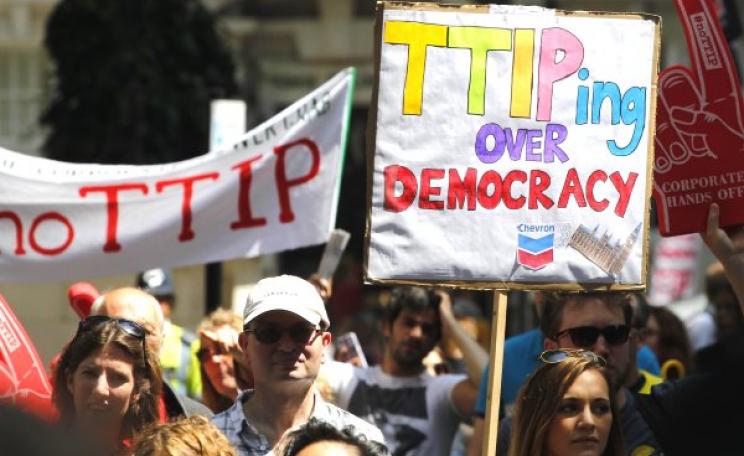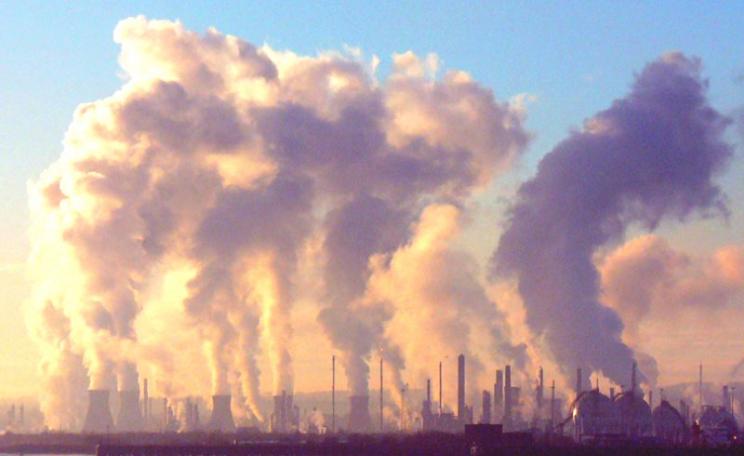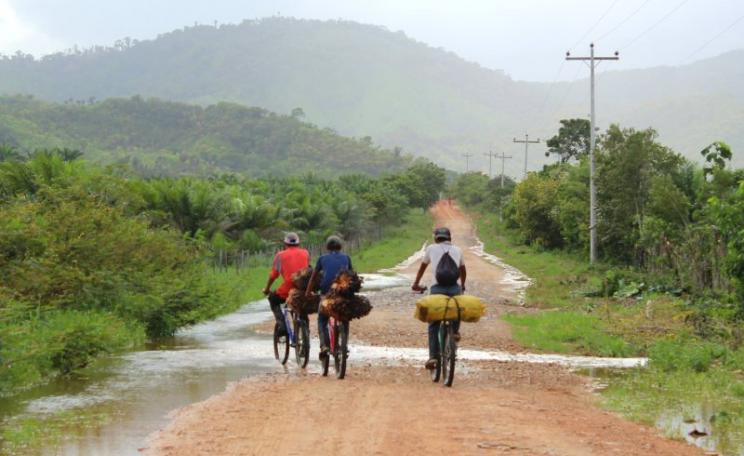The TPP, even more so that previous deals, has very little to do with trade and much to do with solidifying corporate control over life, arguably the most significant erosion of what is left of formal democracy yet.
So-called 'free trade' agreements are continually advertised as creators of jobs, yet jobs are lost and wages decline once they go into effect.
As representatives of the 12 countries participating in the Trans-Pacific Partnership gather today in New Zealand to sign the agreement, the usual unsubstantiated claims are being put forth.
Why is this so? I mean beyond the obvious answer that such claims are propaganda in the service of corporate elites and financiers.
Corporate-funded 'think tanks' that pump out a steady barrage of papers making grandiose claims for 'free trade' deals that are relied on by the political leaders who push these deals require some data, no matter how massaged.
One organization prominent in this process is the Peterson Institute for International Economics, which has issued rosy reports in expectation of deals like the North America Free Trade Agreement - for example, it predicted 170,000 new jobs would be created in the US alone in 1995 and that the Mexican economy would grow by four to five percent annually under NAFTA.
A pocketful of mumbles
One way to look at this is that the Peterson Institute is to 'free trade' agreements as the Heartland Institute is to global warming. Heartland began as a Big Tobacco outfit issuing reports denying links between smoking and cancer.
As late as 1998, Heartland President Joe Bast claimed that there were "few, if any, adverse health effects" associated with smoking and boasted to a Phillip Morris executive that "Heartland does many things that benefit Philip Morris's bottom line, things that no other organization does."
Heartland later began specializing in global-warming denial, receiving $676,500 from Exxon Mobil alone between 1996 and 2006; after which it stopped identifying its contributors. Mr. Bast seems to have no shame, writing that "Most scientists do not believe human activities threaten to disrupt the Earth's climate" in an article describing global warming as a "scam". In fact, 97% of climate scientists agree that human activity is behind global warming.
It is this same attitude toward the truth that pervades papers predicting wondrous results from 'free trade' agreements. In contrast to the Peterson Institute's rosy projections, the first 20 years of NAFTA proved to be a lose-lose-lose proposition for Canada, Mexico and the United States:
The TPP, even more so that previous deals, has very little to do with trade and much to do with solidifying corporate control over life, arguably the most significant erosion of what is left of formal democracy yet.
- Almost 5 million Mexican farmers have been displaced with inflation-adjusted wages in Mexico barely above the level of 1980;
- US food prices have risen 67% since NAFTA took effect and two-thirds of displaced manufacturing workers in the US have been forced to take work with reduced wages;
- and Canadians suffered drastic cuts in government benefits while their environmental laws were reversed in the wake of corporate challenges.
Rosy reports rest on ideology, not real world
The Peterson Institute is at it again, first claiming the Trans-Pacific Partnership (TPP) will result in gains of US$1.9 trillion, and in a new report once again making extravagant claims even if scaled back. In its latest report, the Institute claims there will be no net job losses, while annual income in the US would increase by $131 billion.
These sorts of predictions are routine, and not the product of any single corporate organization. How is it that, all actual experience to the contrary, these sorts of calculations are presented with a straight face?
The political economist Martin Hart-Landsberg, in his book Capitalist Globalization: Consequences, Resistance, and Alternatives, writes that economic models that presume wondrous benefits from 'free trade' agreements assume, inter alia:
- There are only two inputs, capital and labor, which are able to move instantaneously but never cross national borders.
- Total aggregate expenditures in each economy will be sufficient, and automatically adjust, to ensure full use of all resources.
- Flexible exchange rates will prevent lowered tariffs from causing changes in trade balances.
Thanks to these starting points, Professor Hart-Landsberg writes, "this kind of modeling assumes a world in which liberalization cannot, by assumption, cause or worsen unemployment, capital flight or trade imbalances. Thanks to these assumptions, if a country drops its trade restrictions, market forces will quickly and effortlessly lead capital and labor to shift into new, more productive uses.
"And since trade always remains in balance, this restructuring will generate a dollar's worth of new exports for every dollar of new imports. Given these assumptions, it is no wonder that mainstream economic studies always produce results supporting ratification of free trade agreements."
Given the strong biases in favor of 'free trade' agreements, all the more skeptical of the TPP we may be when we see the tiny gains forecast by the World Bank. Vietnam is expected to see the biggest boost among the 12 TPP countries, according to the World Bank forecast - a 10% gain in gross domestic product cumulative through 2030. In other words, less than one percent per year. As a TechDirt summation of this report noted:
"So according to the World Bank's figures, the US will gain an extra 0.04% GDP per year on average, as a result of TPP; Australia an extra 0.07% annually, and Canada a boost of 0.12% per year."
If this is the best that promoters of corporate hegemony can come up with for the TPP, its likely effect will surely be dismal.
The vanishing 'gains'
Jane Kelsey, a New Zealand law professor who has long sounded the alarm on the TPP, notes that even the slightly larger gain forecast for that country would actually constitute a statistical blip that may or may not actually exist. She writes:
"[The] National [government]'s glitzy new 'TPP fact' page is bad wine repackaged in new bottles. Here's a few facts they don't tell you. The projected economic gains of 0.9% of GDP by 2030 are within their own margin of error, even before costs are factored in and disregarding unrealistic modelling."
A more balanced investigation conducted by Tufts University researchers Jeronim Capaldo and Alex Izurieta led to the conclusion that the TPP, if enacted, would result in the loss of three-quarters of a million jobs through 2025, including 448,000 jobs to be lost in the US alone. Canada, Mexico, Japan and Australia would each suffer jobs losses in the tens of thousands. The Tufts report concludes:
"The TPP would lead to higher inequality, with a lower labor share of national income. We expect competitive pressures on labor incomes, combined with employment losses, to push labor shares of national income further down, redistributing income from labor to capital in all countries. In the USA, this would exacerbate a multi-decade trend."
Working people in the 11 other TPP countries would get to experience the stagnant wages and declining living standards that United Statesians have been treated to during the past three decades.
More than 330,000 manufacturing jobs are expected to be lost in the US alone if TPP is passed, according to a separate calculation by the United Steelworkers, and Unifor estimates that 20,000 Canadian jobs in auto manufacturing alone are at risk.
If no gain, there will be pain for you
Underlying all this further tilting of the scales already heavily weighted toward corporate money and power is the 'investor-state dispute settlement' provision, whereby multi-national corporations can sue governments to overturn laws and regulations they don't like under the excuse that measures to protect safety, health or the environment constitute a 'taking' of their expected profits - not even actual profits.
The secret tribunal that will hear corporate complaints (the same as the one used under NAFTA) must assume the corporation's claim is true under some circumstances.
Canada, because it has higher standards than do the US or Mexico, is most frequently sued under NAFTA, although the Canadian pipeline company TransCanada has committed the latest outrage, suing the US government for $15 billion because the Obama administration declined to permit the Keystone XL pipeline. TransCanada is suing for $15 billion even though it has spent $2.4 billion on the pipeline.
Although the governments of the 12 TPP countries are 'signing' the agreement today, that is a formality: The deal must still be approved by legislatures and implementing legal changes enacted.
The TPP would enter into force 60 days after all 12 signatories ratify it or, if that doesn't happen within two years, in April 2018 if at least six of the 12 countries accounting for 85% of the combined gross domestic product of the original signatories have ratified the agreement.
That 85% can't be reached without the US or Japan, effectively giving those countries a veto and thus placing extra responsibility on opponents in both those countries. It also can't be reached if Canada, Australia and Mexico each fail to ratify, so opponents there can also stop it.
The TPP, even more so that previous deals, has very little to do with trade and much to do with solidifying corporate control over life, arguably the most significant erosion of what is left of formal democracy yet. Regardless of where you live, the TPP can be defeated if we continue to organize.
And once the TPP is sent to the trash heap, it will be time to go on the offensive to roll back existing trade pacts.
Pete Dolack is an activist, writer, poet and photographer, and writes on Systemic Disorder. His forthcoming book 'It's Not Over: Lessons from the Socialist Experiment', a study of attempts to create societies on a basis other than capitalism, will be published by Zero Books in February 2016.
This article was originally published on Systemic Disorder.
Also on The Ecologist: 'Never mind today's signing charade: TPP is heading for the rocks' by Sam Cossar-Gilbert.







